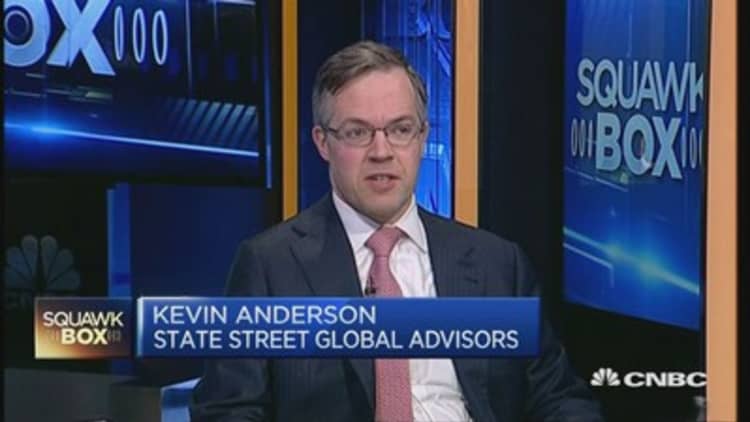
Huge U.S. investor State Street Global Advisors predicts a plethora of problems will push China's growth down to below-consensus 6 percent in 2016.
State Street's Asia Pacific head of investments, Kevin Anderson, told CNBC's Squawk Box on Wednesday that "China has just got a lot of things to deal with next year."
The fund manager expects China's growth to reach 6 percent next year, down from 6.5 percent this year, a call Anderson acknowledged was below consensus.
Excess manufacturing capacity, persistent deflation and an inventory overhang in property were some of the issues weighing on China's economy, he added.
"We heard the PBOC [People's Bank of China] say yesterday they need to continue the reform program despite the [inclusion of the Chinese yuan] in the SDR ... yes, they certainly do," he said, adding that investors will focus on potential reforms initiated at state-owned enterprises.
Anderson's comments came after Chinese Premier Li Keqiang said last week that the country was on track to hit its growth target of about 7 percent this year.
China's economic slowdown has been a concern for global markets this year, hitting prices of commodities and roiling equities.
State Street, which has $2.2 trillion in assets under management, expects recent lackluster growth in Asia to persist into next year, with emerging market sluggishness continuing to weigh on developed economies.
Despite fears about a hard landing in China and its feeble housing market, there are still pockets of opportunities for investors.
High yield U.S. dollar bonds of Chinese developers are especially attractive with effective yields of 8.3 percent a year, UBS Wealth Management's Asia-Pacific Chief Investment Officer, Tan Min Lan, told CNBC's Street Signs.
UBS manages $2 trillion in assets.
The performance of dollar bonds has been boosted by the relaxing of rules in China from mid-2015 that allow offshore listed property developers to raise money onshore at lower interest rates, spurring developers to refinance their debt by raising money onshore while buying back their dollar bonds, Tan added.
"What is going to continue to drive (their) performance going forward is effectively monetary easing that is still to come within China itself," she said.
UBS expects China's reserve requirement ratio to be cut by another 300 to 500 basis points next year. A basis point is 1/100th of a percentage point.


